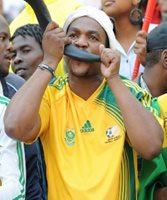Bafana shirts cost too much

"From a factory price of about R100, R150 and the final product in the retail stores being sold for R599, we think that's a disservice to South Africans," SA Clothing and Textile Workers' Union (Sactwu) general secretary Andre Kriel says.
He was addressing a media briefing in Cape Town following talks with Cup Local Organising Committee head Danny Jordaan.
Factory to sponsor to retailer
Holding up a replica shirt, Kriel said it was made at a Sactwu-organised company in Ladysmith, KwaZulu-Natal.
The total cost of producing the garment would probably be between R100 and R150.
That was the price at which it would be sold to sponsors Adidas: the factory was unable to sell directly to retailers because of licensing and branding agreements.
Adidas then sold the shirt into the retail market for R331 excluding VAT.
"Then the retailers as you know if you've been into any retail shop, sell this for R599," Kriel said.
"From our point of view that's ridiculous. "There's obviously reasons that the retailers give, and those reasons are that they've got to add promotions, advertising and all that.
"But any reasonable South African can see that there are margins of competitiveness we can achieve by taking less of a profit cut."
It would be an important stimulus to the clothing industry and local jobs if retailers were prepared to take less of a profit.
Other official gear
Chief executive of Cape Town clothing manufacturer Monviso, Ian Stein, told the briefing that his company made a range of official licensed World Cup garments, including a basic t-shirt that left the factory at under R70.
That shirt was being sold at Pick n Pay at R99, and in Woolworths for R130, which was a "pretty fair" mark-up.
"All we know is that from our point of view we've done our job in bringing out an incredibly competitive product," he said.
A journalist told him she had bought an identical T-shirt in a shop in Sea Point and been charged R230.
Buy local
In a joint statement, the union, Cosatu and Jordaan said soccer supporters could save South African jobs by ensuring that they bought locally made products.
"We call jointly on South Africans to check for the made in SA label inside all World Cup clothing and other goods," it said.
"This includes paraphernalia like caps, bags, flags and other memorabilia."
Counterfeit issues
Jordaan said if people were prepared to buy counterfeit goods, there would always be problems.
"The argument always is, well, I can buy a fake Bafana shirt for R100, why must I pay R500 or R700?
"The problem is, if we continue to buy the fake product, then even those who have the R100 will soon not have the R100 to buy that fake product.
"And so we'll have no money, all of us."
People had to decide whether they were prepared to make a short-term sacrifice for long-term benefits, he said.
Source: Sowetan
Source: I-Net Bridge

For more than two decades, I-Net Bridge has been one of South Africa’s preferred electronic providers of innovative solutions, data of the highest calibre, reliable platforms and excellent supporting systems. Our products include workstations, web applications and data feeds packaged with in-depth news and powerful analytical tools empowering clients to make meaningful decisions.
We pride ourselves on our wide variety of in-house skills, encompassing multiple platforms and applications. These skills enable us to not only function as a first class facility, but also design, implement and support all our client needs at a level that confirms I-Net Bridge a leader in its field.
Go to: http://www.inet.co.za






















